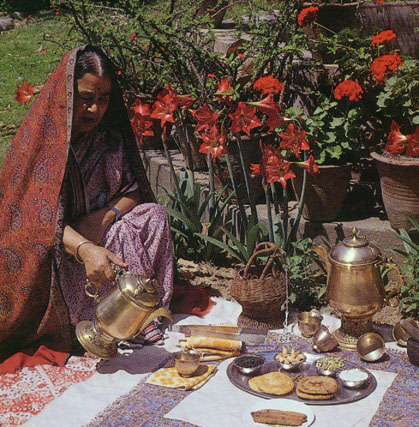There is no home in Kashmir that does not have a samovar. Each family has one or two samovars. Kashmiris make tea in the samovar. Kashmiris are very fond of tea. That is why any time is considered tea time.

Koshur Sama:va:r with 4 khae:s (cups)
Samovars are
not of only one type. Some samovars, in which only one or two cups of tea
can be made, are very small. Other samovars, in which hundreds of cups
of tea can be made, are very big. Samovars are made of copper or brass.
Kashmiris can
make two or three types of tea in the samovar. The kehvi is the favorite
tea of Kashmiris. This tea is also call mogil cha:y. There is a special
tea for making it. It is called bambay cha:y. The bambay cha:y, sugar,
cardamom, cinnamon, and almonds are boiled in water, but no milk is added.
The second type of tea is dabal cha:y. It is made with bambay cha:y, sugar, cardamom, and almonds. Milk, however, is also added. Kashmiri Pandits serve dabal cha:y at weddings and on feasts.
The third type or tea is called shi:r' cha:y. This type is not made with bambay cha:y. There is another kind of tea used for making that. It is prepared with bicarbonate of soda, salt, milk, and cream (mala:y). It has a very pleasant color. Shi:r' cha:y also is a typically Kashmiri tea, but not everyone likes it.

Tea being poured from a sama:va:r into a kho:s (cup).
A kangir, the traditional Kashmiri fire-pot, is nearby.
It is difficult to say when the samovar was first introduced into Kashmir. In addition to Kashmir, the samovar is also found in Russia and Persia. Kashmiri tea can only be enjoyed in a Kashmiri kho:s (cup)Text reproduced from:
An Introduction to Spoken Kashmiri
by Braj B. Kachru
No comments:
Post a Comment